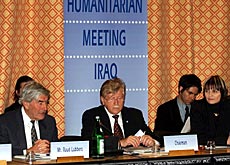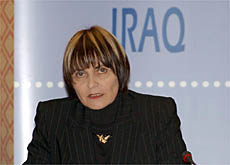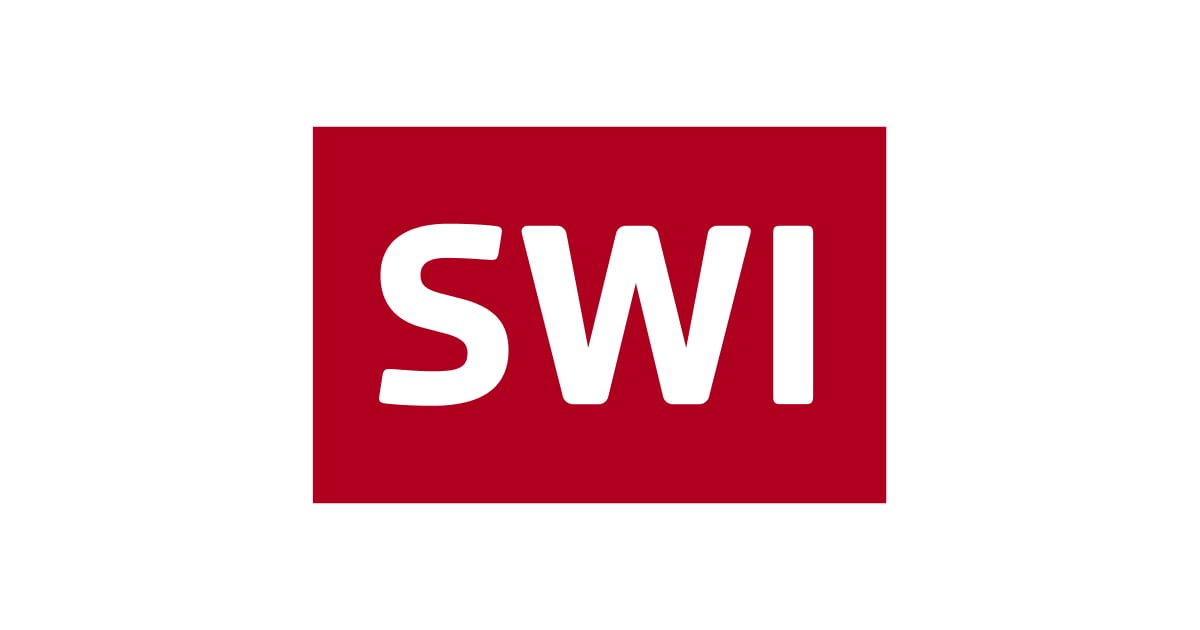ICRC ready for war in Iraq

The International Committee of the Red Cross (ICRC) says it's prepared for a humanitarian crisis in Iraq should a war take place.
However, the Swiss president of the organisation, Jakob Kellenberger, remains hopeful that a peaceful resolution to the crisis can be found.
He shared his views on a possible war with swissinfo’s Anna Nelson and Frédéric Burnand.
swissinfo: How prepared is the ICRC for an eventual war against Iraq?
Kellenberger: The ICRC has been increasing its presence in Iraq and neighbouring countries since October. We’ve made huge preparations within the framework of our capacities and we’re now ready to assist around 150,000 displaced persons in Iraq.
Logistically, we could move quickly to cope with as many as half a million, which is quite impressive for a single organisation. However, I would like to stress that these preparations do not signify that the ICRC believes war is inevitable and I continue to hope that a peaceful solution can be found.
What challenges does the ICRC face in preparing for a war that is, in many ways, unforeseeable?
There are basically two unforeseeable factors: the way in which military action would take place and the consequences of conflict. We’re not basing our preparations on speculation but we’ve been present in Iraq for 23 years so we’re very familiar with the situation on the ground and we’re well placed to evaluate the humanitarian needs there.
You can never be fully prepared… but it’s fair to assume that military strikes would result in a humanitarian crisis and that a large number of people would flee from the major cities.
Some are likely to become refugees and will therefore fall under the responsibility of the United Nations High Commissioner for Refugees. But it will be up to the ICRC to help the internally displaced persons.
We also have enough staff and supplies in place to keep the hospitals running and to ensure that their water and sewage systems will function. We will also need to deal with prisoners of war and make sure that they are accounted for and that they receive visits.
Are you concerned that a war on Iraq could have ramifications for the rest of the Middle East?
Yes, I believe there would be humanitarian consequences for the region but I wouldn’t want to speculate at this point.
Switzerland recently organised an international conference aimed at bringing humanitarian organisations together with governmental bodies to discuss the crisis. Has anything concrete resulted from this initiative?
From the ICRC’s point of view, the conference presented a useful opportunity to exchange information between the relevant parties. But it hasn’t had an impact on our operations because we’ve been coordinating with other humanitarian groups and preparing for conflict for months.
Many non-governmental organisations (NGOs) have expressed concern that US military operations could hamper humanitarian activities in Iraq. Is the ICRC concerned that its staff might wind up being dependent on the US when it comes to their movements?
In this case, as in other conflicts, the ICRC will not compromise over its autonomy, neutrality or impartiality. As an example, US forces were present and active in Afghanistan but we were able to carry out our responsibilities there according to our principles.
Have Baghdad or Washington been willing or able to guarantee the safety of ICRC staff in Iraq?
There are never any guarantees but it’s certain that the safety of our workers is an absolute priority. Therefore, we are always careful to make sure all of the countries involved accept our work. In the case of Iraq, our presence is accepted and respected by the relevant parties.
Would the ICRC consider evacuating its employees from Iraq if it becomes unsafe to remain?
The ICRC plans to remain in Iraq, as was the case in 1991, but the situation could arise that we would have to pull our people out.
It’s rumoured that the US military might use high-precision nuclear weapons to strike strategic targets in Iraq. Would this qualify as a violation of international humanitarian law?
Technically, the only thing that’s forbidden under international humanitarian law is the use of biological or chemical weapons, as well as the excessive use of arms and those that cause suffering. There’s nothing that specifically forbids the use of nuclear weapons but it’s hard to believe that such arms would not cause suffering.
Many NGOs have said that human rights and international humanitarian law are being violated in the global fight against terror. What’s the ICRC’s view?
The ICRC believes the fight against terrorism comes in many forms, including armed conflict and war. When it’s a fight of this nature, then humanitarian law must come into play. There are many areas of law concerned with this fight and I feel strongly that the respect for human rights should not be an obstacle to combating terror.
swissinfo – interview: Anna Nelson and Frédéric Burnand
The ICRC has 35 expatriate and 365 national staff members in Iraq.
Its 2003 operational budget for Iraq amounts to almost 22 million francs.
The ICRC is ready to deal with 150,000 internally displaced persons should a war take place in Iraq and says it could move quickly to cope with as many as half a million.
The ICRC has been present in the country since the outbreak of the Iran-Iraq war in 1980.

In compliance with the JTI standards
More: SWI swissinfo.ch certified by the Journalism Trust Initiative













You can find an overview of ongoing debates with our journalists here . Please join us!
If you want to start a conversation about a topic raised in this article or want to report factual errors, email us at english@swissinfo.ch.